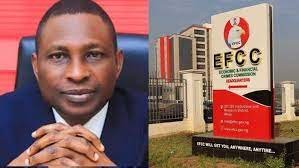Corrupt politicians now hide loot in cryptocurrencies – EFCC
By Akeem Abas
Mr Ola Olukoyede, Chairman of the Economic and Financial Crimes Commission (EFCC), has alleged that some corrupt politicians now conceal stolen public funds in cryptocurrencies to evade detection and prosecution.
He made the allegation during an AU Anti-Corruption Day event on Thursday in Ibadan.
Olukoyede, represented by the Commission’s Acting Zonal Director in its Ibadan office, Hajiya Hauwa Ringim, said that virtual assets were becoming preferred channel for hiding illicit wealth.
He described virtual assets as digital monetary representations that could be traded or transferred, stressing that while not criminal, they become dangerous when used fraudulently.
Olukoyede lamented Africa’s growing loss to illicit financial flows, listing money laundering and digital fraud schemes as major threats to the continent’s development.
He said that the EFCC had observed an alarming increase in politicians using cryptocurrency wallets to store unexplained wealth and facilitate fraudulent investment activities.
The EFCC boss said that the agency was addressing the challenge with training and intelligence.
According to him, the commission’s efforts resulted in breakthroughs like the CBEX investment scam investigation as well as prosecution.
Olukoyede warned investors against negligence, saying most scams succeeded due to lack of due diligence and delayed reporting of suspicious transactions to relevant authorities.
He said that ponzi schemes remain widespread, with desperate investors easily falling prey to enticing but fake digital investment promises.
The commission’s chairman said that virtual assets fraud could be prevented through public awareness, proactive measures and stakeholder engagement by anti-graft agencies as well as regulators.
Olukoyede added that understanding digital fraud was crucial, urging citizens to acquire knowledge and report shady schemes before they escalate into national scandals.
A professor of Criminology from the University of Ibadan, Oludayo Tade, said Nigerians must beware of unrealistic digital investment promises that signal fraud.
He advised Nigerians to avoid schemes offering suspiciously high returns, warning that 50 per cent profit within a week are clear signs of deceit.
The don said that fraudsters exploit the image of celebrities as well as influencers to build trust and deceive unsuspecting investors across media platforms.
He called on government agencies to expand public awareness of red flags, warning that many victims often fell for similar scams repeatedly due to ignorance.
The criminologist urged authorities to fund investigative efforts and punish offenders, saying fraud prevention was more effective than belated enforcement actions.
The event had in attendance, the Special Adviser to the Oyo Governor on Security, retired CP Fatai Owoseni, Security Commanders, Civil society organisations, students, youth groups among other stakeholders.(NAN)
Edited by Bayo Sekoni












